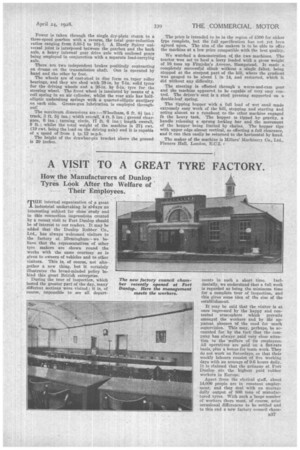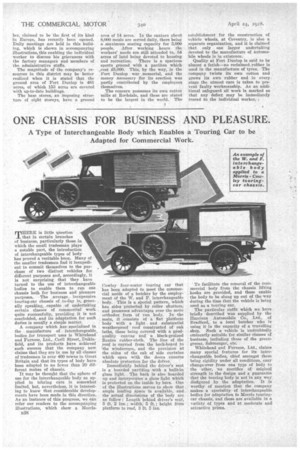A VISIT TO A GREAT TYRE FACTORY.
Page 63

Page 64

If you've noticed an error in this article please click here to report it so we can fix it.
How the Manufacturers of Dunlop Tyres Look After the Welfare of Their Eniployees.
TIIE internal organization of .ft great industrial undertaking is always an interesting subject for close study and in this connection impressions created by a recent visit to Fort Dunlop should be of interest to our readers. It may be added that the Dunlop Rubber Co., Ltd., has always welcomed visitors to the factory at Birmingham—we believe that the representatives of other tyre makers are shown round the works with the same courtesy as is given to owners of vehicles and to other visitors. This is, of course, not altogether a new thing, but it certainly illustrates the broad-minded policy behind this great British enterprise.
During the tour of inspection, which lasted the greater part of the day, many` different sections were visited; it is, of course, impossible to see all depart
ments in such a short time. Inci dentally, we understand that a full week is regarded as being the minimum time for a complete tour of inspection, and this gives some idea of the size of the establishment.
It may be said that the visitor is at once impressed by the happy and contented atmosphere which prevails amongst the workers and by the apparent absence of the need for much supervision. This may, perhaps, be accounted for by the fact that the company has always paid very close attention to the 'welfare of its eniployees. All operative S are paid on a flat-rate basis, plus a bonus for team work. They do not work on Saturdays, so that their weekly labours consist of five working days with an average of 9.6 hours daily, it is claimed that the artisans at Fort Dunlop are the highest paid rubber workers in Europe.
Apart from the clerical staff, about 14,000 people are in constant employment, and they deal with an average daily output of 800 tons of manufactured tyres. With such a.large number of workers there must, of course, arise occasional differences to be settled and to this end a new factory council cham tier, claimed to be 'the first of its kind in Europe, has recently been opened. Daily meetings are held in this building, which is shown in accompanying illustrations, this enabling the individual worker to discuss his grievances with the factory managers and members of theadministrative staffs.
The magnitude of the company's resources in this district may be better realized when it is stated that the ground area of Fort Dunlop is 481 acres, of which 153 acres are covered with up-to-date buildings.
The base stores, an imposing structure of eight storeys, have a ground
area of 14 acres. In the canteen about 8,000 meals are served daily, there being a maximum seating capacity for 3,000 people. After working hours tile workers' needs are still attended to, 54 acres of land being devoted to housing and recreation. There is a spacious sports ground with a pavilion which cost £5,000. This, by the way, is the Fort Dunlop war memorial, and the money necessary for its erection was partly contributed by the employees themselves.
The concern possesses its own cotton mills at Itoehdale, and these are stated to be the largest in the world. The
establishment for the construction of vehicle wheels, at Coventry, is also a separate organization, and it is claimed that only one larger undertaking devoted to the manufacture of automobile wheels is in existence.
Quality, at Fort Dunlop is said to be almost a fetish—no reclaimed rubber is used in the manufacture of tyres. The company twists its own cotton and grows its own rubber and in every _ stage the utmost care is taken to prevent faulty workmanship. As an additional safeguard all work is marked so that any defect may be immediately traced to the individual worker.




















































































































